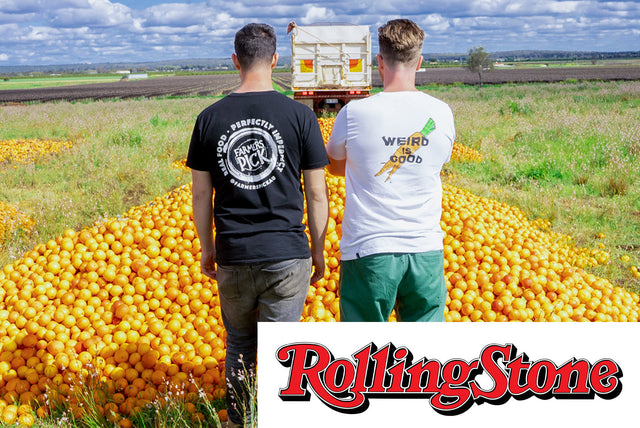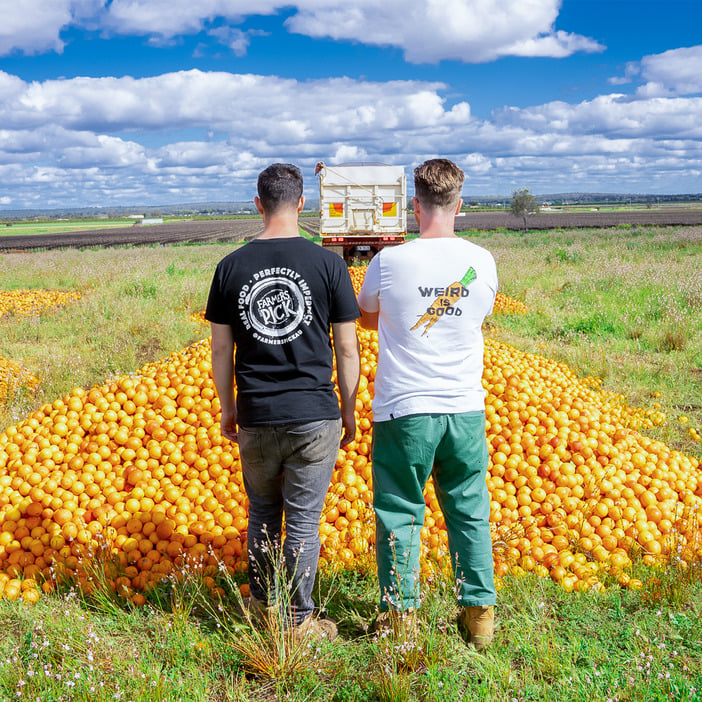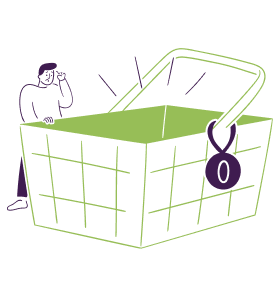
Rolling Stone | Inside Australia’s Battle Against Food Waste
Every year, Australia wastes 7.6 million tonnes of food — enough food to fill the MCG 10 times over.
Up to 10 per cent of global greenhouse gas emissions come from food that we produce, but don’t eat. If we’re talking percentage of total emissions, wasted food is worse than air travel (1.9 per cent), plastic production (3.8 per cent) and oil extraction (3.8 per cent) combined. Say we magically eliminate food waste tomorrow, not only would we feed a lot more people, but we’d save 4.4 million tonnes of C02 a year. That’s like taking one in four cars off the road.
One organisation working to untangle this problem at the farm gate is Farmers Pick, an Aussie startup that began in 2020, which takes farm produce that would otherwise be tossed out, and sells it directly to consumers. Odd-looking pears. Beautiful-on-the-inside broccoli. Cherries only a mother could love.
“What we’ve found is that, on average, 30 per cent of food never leaves the farm. But that varies from crop to crop,” says Farmers Pick co-founder, Josh Ball. “Mushrooms are like 5 per cent waste. Citrus is way higher, like 50 per cent. And this is just crazy inefficient. For example, if I grow a hundred apples, and 50 per cent of them get knocked back, I now have to recoup that expenditure through the 50 I do sell, which means I’m going to charge you a premium for your apples.”
Basically, we’re paying for all the apples we don’t eat, whether we realise it or not. Waste is factored into the price structure of everything, including food. So the more we waste, the more we pay.
“We’ve kind of blindly landed where we are, which is why we need some intentionality,” Ball says. “We need to ask, why do we grow food? What’s the purpose of food? Food is the baseline of our hierarchy of needs, but we don’t place enough value on it. It’s just assumed we will have food forever. The idea we won’t have food just seems ridiculous.”

“We need to ask, why do we grow food? What’s the purpose of food? Food is the baseline of our hierarchy of needs, but we don’t place enough value on it. It’s just assumed we will have food forever.” – Josh Ball
Ball and his co-founder, Josh Brooks-Duncan, began Farmers Pick after spotting some bendy carrots at a local farmer’s market. It was a lightbulb moment. The two mates began digging into food waste, coming at it from a climate change perspective. Why did carrots in the wild look so different from the carrots on supermarket shelves? How the heck don’t we know what a real carrot looks like?
“We wanted to validate the problem, so we literally drove down to a farm in Werribee, outside Melbourne, and walked in the front gate and said, ‘Hey, who’s running this farm? Is this an issue?,’” Ball says. “And they were like, ‘Yeah.’ And they took us out to a field and pointed at some cauliflowers and said, ‘See that one, it’s been nicked by the tractor. Can’t sell it. That one’s got some mud on it. Can’t sell it.’ Rejected, rejected, rejected.”
That was four years ago. Since then, Farmers Pick has saved and sold about seven million kilograms of produce, working with 70 farms and delivering to 20,000 active subscribers up and down the east coast of Australia. The business model focuses on seasonal, local produce, cutting out as many supply chain steps as possible.
“The first few years, I think farmers were wary,” Ball laughs. “They were like, ‘What do you mean? For 30 years we’ve been told this food’s no good. And now you want to pay us for it?’ But farmers put their blood, sweat, and tears into their crops, and they want us to eat all the food that they grow. They don’t want to just chuck it in a paddock. It’s devastating.
“We were up in Griffith, which is one of Australia’s big orange-growing areas, and we saw them dumping a massive 30-tonne trailer of oranges. And you just think, that is so much food. And the guys were like, ‘Yeah, we do this every day. All season.’ And that’s just one farm.”
A wildly complex and inefficient agricultural industry, driven by out-of-control consumer expectations and carbon-heavy supply chains, forced to dump truckloads of food to meet arbitrary corporate standards, meanwhile consumers are tossing millions of tonnes of produce into landfill — voluntarily, mind you — where it warms the planet and (ironically) makes growing conditions worse. And kids are still going to school hungry.
Read the full story on Rolling Stone here.

